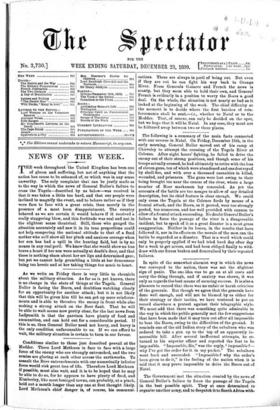The following is a summary of the main facts connected
with our reverse in Natal. On Friday, December 15th, in the early morning, General Buller moved out of his camp at Chieveley to attempt the crossing of the Tugela River at Colenso. After eight hours' fighting, he failed to drive the enemy out of their strong positions, and though some of his troops actually crossed, he had ultimately to retire with the loss of eleven guns, ten of which were abandoned and one destroyed by shell-fire, and with over a thousand casualties in killed, wounded, and prisoners. The guns were lost owing to their being brought too near the course of the river, where a large number of Boer marksmen lay concealed. As yet the accounts of the battle are too meagre to allow of any detailed description, but its chief feature is clear enough. We could only cross the Tugela at the Colenso fords by means of a frontal attack, and the Boers, as it proved, were too strongly posted, too numerous, and too well provided with cannon to allow of a frontal attack succeeding. No doubt General Buller's failure to force the passage of the river is a disagreeable incident, but to speak of it as a great disaster is a most gross exaggeration. Neither in its losses, in the results that have followed it, nor in its effects on the morale of the men can the battle be regarded as a disaster. That is a word which could only be properly applied if we hal tried hard day after day for a week to get across, and had been obliged finally to with. draw with our forces broken and demoralised by their repeated failures.


































